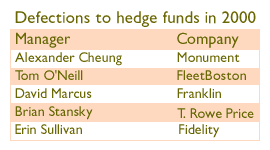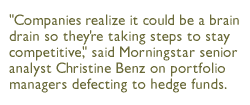|
Fund managers move
|
 |
July 19, 2000: 6:20 a.m. ET
Mutual fund managers jump ship to run hedge funds
By Staff Writer Jennifer Karchmer
|
NEW YORK (CNNfn) - With hopes of making more money and having added freedom running their portfolios, some mutual fund managers are jumping ship for the more lucrative and riskier world of hedge funds.
In the past six months alone, a handful of high-profile fund managers have left large mutual fund shops to seize the opportunity to earn millions while working under the less strict investment guidelines that hedge funds offer.
"It gives them their name on the door and control of their fate to run their own business," said Roxanne Martino, a hedge fund expert in the industry for 25 years. "They become an owner, an entrepreneur -- those things are really appealing. Obviously it's an ego booster."
Fidelity flights
Mutual fund managers aren't exactly running for the exits to start their own hedge funds, but Fidelity Investments in particular has been hit hard by some recent departures.
Erin Sullivan, the 29-year-old manager of the Fidelity Aggressive Growth Fund (FDEGX), left Investments in January to start her own hedge fund. Her departure along with Andrew Kaplan, who ran the Fidelity Select Developing Communications (FSDCX) and Select Technology (FSPTX), and Matt Grech, manager of the Fidelity Select Electronics (FSELX), triggered a ripple effect at the Boston-based fund firm forcing management to rejigger its lineup to plug the holes.
 Sullivan, for example, was replaced with Robert Bertelson, manager of the Fidelity OTC Fund (FOCPX). Sullivan, for example, was replaced with Robert Bertelson, manager of the Fidelity OTC Fund (FOCPX).
But Fidelity isn't the only mutual fund company affected by top-flight managers departing for the appeal of hedge funds. David Marcus, who ran the Franklin Templeton Mutual European Fund (MEURX), left in February to launch his own hedge fund. And Brian Stansky departed from T. Rowe Price for the allure of the riskier investments.
Just this month, Tom O'Neill, chief executive officer and chief investment officer at FleetBoston Investment Advisors, announced plans to leave the bank to run hedge funds full time.
"I've had two passions," said O'Neill, who was a fund manager prior to being named CEO at FleetBoston. "One was to run a large investment organization. The other was to be involved with hedge style investing." O'Neill, whose contract expires with FleetBoston at the end of July, will take his Navigator Funds and set up his own operation in downtown Boston.
"I'll have more arrows in my quiver," he added, referring to the wider variety of strategies hedge funds employ such as shorting and leverage.
Dollar signs on the horizon
So why would a mutual fund manager racking up impressive gains want to defect to the hedge fund world?
 Aside from having more flexibility in the fund, compensation also plays a factor. Hedge fund managers typically take 20 percent of a fund's profit. If a $500 million hedge fund gained 30 percent, or $150 million, the managers would get $30 million. Aside from having more flexibility in the fund, compensation also plays a factor. Hedge fund managers typically take 20 percent of a fund's profit. If a $500 million hedge fund gained 30 percent, or $150 million, the managers would get $30 million.
Because it's tough for mutual fund companies to compete with the dollars that hedge funds can offer managers, some firms are changing gears to entice their top talent to stick around.
"Some at Fidelity in top management view it as a concern," said Morningstar senior analyst Christine Benz, referring to the recent departures. A Fidelity spokesperson said the Boston asset management firm has no plans to launch or manage hedge funds of its own.
But some fund companies are responding by offering hedge funds to retail investors to retain the top fund manager talent it may lose to the riskier investments. Unlike the $1 million minimum investment requirement typical to hedge funds, these new funds will have lower requirements allowing not just the super rich to take part in.
The Invesco Funds Group, for example, plans to introduce the Invesco Advantage Fund at an initial-offering price of $10 per share with a $10,000 minimum investment - much more in line for retail investors.
"I would say it's a dueling trend that retail mutual fund companies are starting hedge fund like vehicles to retain that talent," Benz said. "That is a weapon in a fund company's arsenal."
Others are more cautious about opening up to typical investors what are perceived to be riskier funds designed for more sophisticated investors.
"Hedge funds can be volatile and risky and we want to be sure to offer it to the right clientele," said John Reilly, a spokesman for MFS Investment Management, which is in the works to offer hedge-fund-type investments. "It's not for Ma and Pa Kettle."
Should you jump ship amid the change?
So let's say you receive notice that the manager of one of your mutual funds has quit to move on to hedge funds. Should you immediately jump ship yourself or stay the course when management shifts?
 While a manager shift is a red flag, financial planners say it doesn't make sense to sell out of the fund without doing your homework first because you're going to pay taxes on the sale. While a manager shift is a red flag, financial planners say it doesn't make sense to sell out of the fund without doing your homework first because you're going to pay taxes on the sale.
So it depends on the type of fund you own.
"If it's a guru-driven fund, with a great stock picker - like if David Alger stopped running the Alger Fund -- we would expect the unknown," said certified financial planner (CFP) Steven Kaye. "Whenever there is a manager change, most of the time you don't know what the hell you're going to get."
So Kaye suggests you review the new manager's track record and performance history before making any decisions. If the manager had been a co-manager on the same fund, chances are he's going to do well because he's worked closely with the original manager. But if a growth fund manager takes over a value-oriented portfolio, you may be more cautious because of the change in investment styles.
"Fund companies are increasingly looking at this as a retention tool," Benz said. "Perhaps its one way to keep your fund manager on board. I don't know if it's a full blown turning point, but companies realize it could be a brain drain so they're taking steps to stay competitive." 
-- Staff Writer Jennifer Karchmer covers hedge funds for CNNfn.com. Click here to send her e-mail.
|
|
|
|
|
 |

|

